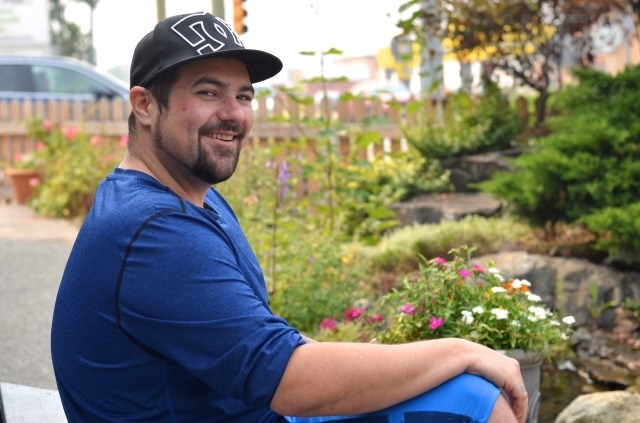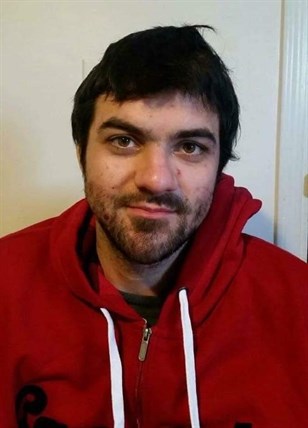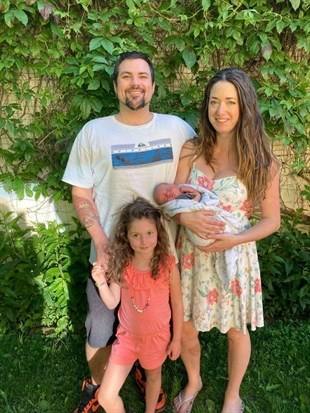
Jacob Philp, healthy, happy and clean in this September 2018 photo.
(CHARLOTTE HELSTON - REPORTER / iNFOnews.ca)
February 21, 2021 - 3:30 PM
Heavily addicted to fentanyl and meth and having just overdosed, Jacob Philp woke up in a hospital bed to hear that he'd stopped breathing for eight minutes.
Philp's parents were at his bedside in tears as medical staff told him they didn't think he was going to make it.
But Philp didn't apologize for what he'd just put his parents through, or thank the healthcare workers for saving his life. Instead, he demanded to know how much naloxone he'd been given because the larger the dose the longer he'd have to wait for it to wear off so he could get high again.
"I was swearing and yelling at them," Philp said. "I got up and the first thing I did was go out... to find more dope because I was going to get sick."
Such was the grip of Philp's addiction he didn't even acknowledge what had just happened to him.
"My life today is literally the polar opposite of that," he says.
On Feb. 1, the 33-year-old celebrated four years sober.
Four years earlier he entered Bill’s Place, a residential substance abuse treatment centre in Vernon.
"I am one of many great success stories that have come from Bills Place," he said.
In the four years since he's been sober, he's been married and had two children, bought a house and works full-time as a supportive housing program coordinator for Turning Points Collaborative Society.
But, all that almost didn't happen.
Philp spent years living on the streets of Kelowna, with an opioid addiction that was costing him $500 to $600 a day. And if he didn't have drugs he'd get "dope" sick.
"I describe it as the most emotional mental and physical pain a person can be in, it's absolutely unbearable," he says.
So he'd do anything to support his habit.
He'd shoplift and steal stuff. He'd snatch purses from shopping carts in grocery stores, and manipulate loved ones for "one more chance" just so he could rip them off once again.
He spent his days taking drugs or trying to get money so he could get drugs to take.
He fit the stereotype of the homeless fentanyl addict perfectly.
But Philp's life didn't start like this.
"I came from a pretty good home, I had good parents, things went well," Philp says.
He admits he was afraid of everything as a kid and lied a lot, calling himself a chameleon at school, changing and pretending to be whatever people wanted him to be to fit in.
"I tried weed for the first time and it completely fixed that problem, I had no more fear, I was confident," he says. "But of course (with) the nature of addictions it progressed and it got worse and I went from weed to psychedelics and party drugs into cocaine."
While Philp took a lot of recreational drugs in his teens and early twenties he still held his life together.
He worked as an apprentice roofer, made music, and spent a lot of time DJing in nightclubs in Kelowna. He did a lot of partying.
"My life wasn't unmanageable at this point of time," he says.
But when he had the chance to try heroin with a friend at a party everything started to change. He was 23 years old.
"When I first started doing heroin I felt like superman... I could stay awake all night and go to work the next day and be super on point," he says.
It didn't last long.
He says he got "wired to it" and if he didn't use he'd get sick. His habit started getting very expensive.
He pawned all his music equipment and the rest of his belonging, thinking he'd get them back later. He never did. His truck got repossessed and he stopped paying the rent.
The sickness caused by his heroin withdrawals meant he missed work and he quickly got fired. The unpaid rent meant his landlord kicked him out.
Philp had first tried heroin in September and by the following March he was homeless and living on the streets of Kelowna. It only took six months for everything to fall apart.
"I became known to law enforcement in Kelowna rather quickly," he says.
He ramped up a lot of criminal charges and ended up in court. It didn't phase him though.
"One of the things they don't tell you about opioids is that they completely numb your emotional and mental pain... so when I was sitting in court I really didn't care," he says. "It didn't really matter doing what you are telling me (because) as soon as I'm let out of that courtroom I'm going to go back doing (drugs)."
He spent a short period of time in jail but it had little effect.
"It really isn't hard to get drugs in jail, I came out just as wired as I was when I went in," he said.
His lifestyle continued and in late 2016 he spent two months in jail. But things had changed when he got out.
"It wasn't heroin on the street anymore it was fentanyl," Philp said.
And then people started overdosing.

Jacob Philp during treatment.
Image Credit: SUBMITTED/Jacob Philp
Philp believes he overdosed about dozen times. Amazingly he was always found and did not become a statistic.
In 2020 1,716 people died from illicit drug overdoses in B.C., the highest number ever recorded. Since 2012 more than 5,600 people have died of fentanyl-related overdoses.
He was lucky, but many weren’t, including people that were close to him.
At 2 a.m. in late January, he was getting high with a friend in a bus shelter in the freezing cold.
"I open my eyes and the suns kind of peaking over the mountain and I'm freezing so we've been out there a while, and I look and he’s dead on my shoulder… he’s got icicles forming from his eyes, he blue, he's gone," Philp said.
Philp is articulate and very open and talking to him it's hard to fathom it was him in these situations. He doesn’t try to shock or garner sympathy as he relays his story, and just talks honestly about his former lifestyle.
He says he feels blessed about where he is now when he recalls these events.
His addiction fuelled his crimes had it started to catch up with him. He ramped up more charges and was looking at a decent jail sentence.
His parents gave him another chance.
Philp’s mom forked out "a ton of money" for a lawyer and he was told if he went to rehab there would be a strong chance he’d avoid jail time. He agreed.
"I went just to stay out of jail," he said. "I didn’t count on treatment actually working."
But it did.
"I went for the wrong reason… but I stayed for the right reasons."
Philp stayed at Bill’s Place for eight months.
While there is no one size fits all when it comes to treatment, having access to a residential treatment bed at Bill’s Place was exactly what Philp needed.
And what would have happened if he’d gone to jail instead of being given a place to live and receive treatment?
"In my heart, I feel I would've died there or died shortly after getting out," he said.
But getting a spot at the 20-bed residential facility means waiting until one is available. In Philp’s case, he waited two months for a spot.
In early February, the provincial government announced it was spending $13 million on 100 recovery beds around the province, eight of which will be at Bill’s Place.
While it’s a step in the right direction instant access to residential treatment is what’s needed.
"If there was a bed available for someone at the moment somebody is ready to take it that would be life-changing for so many people," he said.
Living under a strict court-ordered curfew and waiting for a treatment spot while staying with his dad, who’d given him yet another chance, Philp was still heavily addicted.
His dad then went away for the weekend.
"And he looks at me and he says, ‘If I come back on my TV is gone and my car's gone, I'm pulling your bail and you're going to jail,’” Philp said. "That night of course I pawn the TV…and do everything I'm not supposed to… I have a bunch of drug dealers over and we set the fire alarm off to the complex at 2 or 3 a.m."
That night I got me and my dad evicted from his place."
Now with nowhere to live and breaching his bail terms, Philp was certain he was going back to jail.
Luckily, a bed at Bill’s Place opened up.
"That was salvation for me," he said. "I found a sense of family there and a sense of belonging that I have never had in my entire life."
And it completely changed his life.

Jacob Philp with his family.
Image Credit: SUBMITTED/Jacob Philp
Philp's parents gave him another chance, but for addicts who have burned every single bridge just having the means and wherewithal to be on a waitlist for a treatment centre is a considerable barrier to ever making it happen.
Philp says instant access to immediate recovery beds could change that.
Philps says there were moments throughout his addiction where would have jumped into a treatment bed, but the moments are very fleeting, and the waitlists lengthy.
He says he’s sharing his story to give people hope.
"If (I can) help anybody find their path to recovery, or even just to encourage people, it is possible to change, not to give up hope, I was hopeless for a long time and I didn't think there was any hope or chance for me at all, and my life changed so dramatically, so fast that I (know) there is hope, and don't ever give up, and take that jump as scary as it can be."
Philp reiterates he's not the exception but one of many who have come through treatment successfully. One friend is working as a contractor, another running a tattoo business, another has gone back to school to become a teacher.
"I feel like I'm living a life that I dreamed of having my whole life... so I just feel eternally grateful," he says. "I live in a state of gratitude."
To contact a reporter for this story, email Ben Bulmer or call (250) 309-5230 or email the editor. You can also submit photos, videos or news tips to the newsroom and be entered to win a monthly prize draw.
We welcome your comments and opinions on our stories but play nice. We won't censor or delete comments unless they contain off-topic statements or links, unnecessary vulgarity, false facts, spam or obviously fake profiles. If you have any concerns about what you see in comments, email the editor in the link above.
News from © iNFOnews, 2021